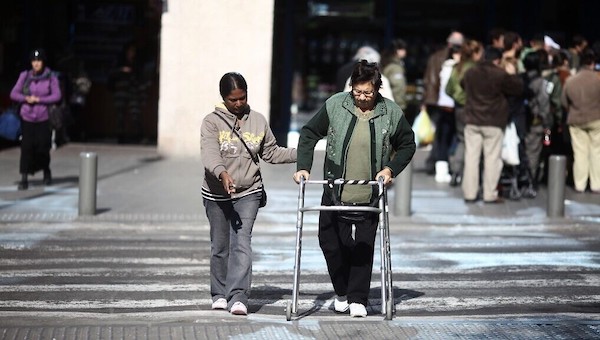
ILLUSTRATIVE: A CARER HELPING AN ELDERLY ISRAELI TO CROSS THE STREET IN TEL AVIV. (KOBI GIDEON/FLASH90)
‘MODERN SLAVERY’: HOW FOREIGN CAREGIVERS IN ISRAEL HAVE BEEN EXTORTED FOR DECADES
BY: INNA LAZAREVAORIGINAL SITE: TIMES OF ISRAEL
Proverbs 29:18 KJV (AWFSM)
TOPICS
Activism
AI
Belief
Big Pharma
Conspiracy
Cult
Culture
Economy
Education
Entertainment
Environment
Faith
Global
Government
Health
Hi Tech
Leadership
Politics
Prophecy
Science
Security
Social Climate
Universe
War
TOI investigates bribes of up to $25,000: 'it’s been going on for 30 years'. It is close to midnight and Natalia, an Uzbek woman in her late 40s, is finally on a break from her job as a live-in carer for a wheelchair-bound elderly Israeli woman.
But instead of putting her feet up, Natalia is already at her second — illegal — workplace. Balancing a mop inside a bucket of soapy water, a spray bottle of detergent on her arm and dust cloths draped over her shoulder, she wipes down the gleaming floors and grand mirrors in a downtown Tel Aviv apartment building.
She tells The Times of Israel that she is working these two jobs to climb out of debt from an almost $10,000 “placement fee” — an illegal charge she was compelled to pay six years ago to an employment agency’s shadowy “broker” in order to obtain a job in Israel.
“If I complain, the authorities will not do anything; the only person who will lose out is me,” she says. “There is no justice here.”
Almost every Israeli family is familiar with foreign care workers who arrive to look after aging and ailing relatives. Hailing from the Philippines, India, Sri Lanka, Nepal, Uzbekistan, Moldova, Ukraine and other countries, they occupy a room in the apartment and stay with their charges every day, all day. But otherwise, they are effectively invisible in public life.
Few realize that almost all of these foreign workers are victims of a multi-million-shekel criminal industry taking illegal brokers’ fees that is operating both in Israel and abroad. The illicit business extorts money from would-be caregivers — people who are often driven by financial desperation to leave their families and loved ones and travel to Israel — to secure jobs for them here.
These illegal placement fees for foreign care workers are off the books and can be as high as $25,000. To pay the bribes, applicants are often forced to sell their possessions, cash in their life savings, or borrow from moneylenders charging high interest rates.
THIS SYSTEMIC EXTORTION HAS BEEN KNOWN TO THE ISRAELI ESTABLISHMENT FOR YEARS. IN 2018, SUPREME COURT JUSTICE ISAAC AMIT DESCRIBED THE PRACTICE AS A ‘REPUGNANT PHENOMENON WHICH COULD BE PERCEIVED AS MODERN SLAVERY’
An investigation by The Times of Israel reveals that these black market operations have been ongoing for almost three decades, but not a single inquiry by the authorities has resulted in criminal charges. The caregivers say the authorities will not hold any agency to account on this issue, and are intimidated against sounding alarm bells by the brokers’ threats.
This systemic extortion has been known to the Israeli establishment for years. In 2018, Supreme Court Justice Isaac Amit described the practice as a “repugnant phenomenon which could be perceived as ‘modern slavery’ or as trafficking in human beings for labor purposes.”
And while there are attempts at solutions, the corruption remains rampant: Bilateral agreements between governments are widely seen as a remedy, but The Times of Israel obtained evidence — through direct interviews, recorded calls, and complaint letters — that suggests that, in some cases, illegal fees continue to be charged even to those who are supposed to be protected by such an agreement.
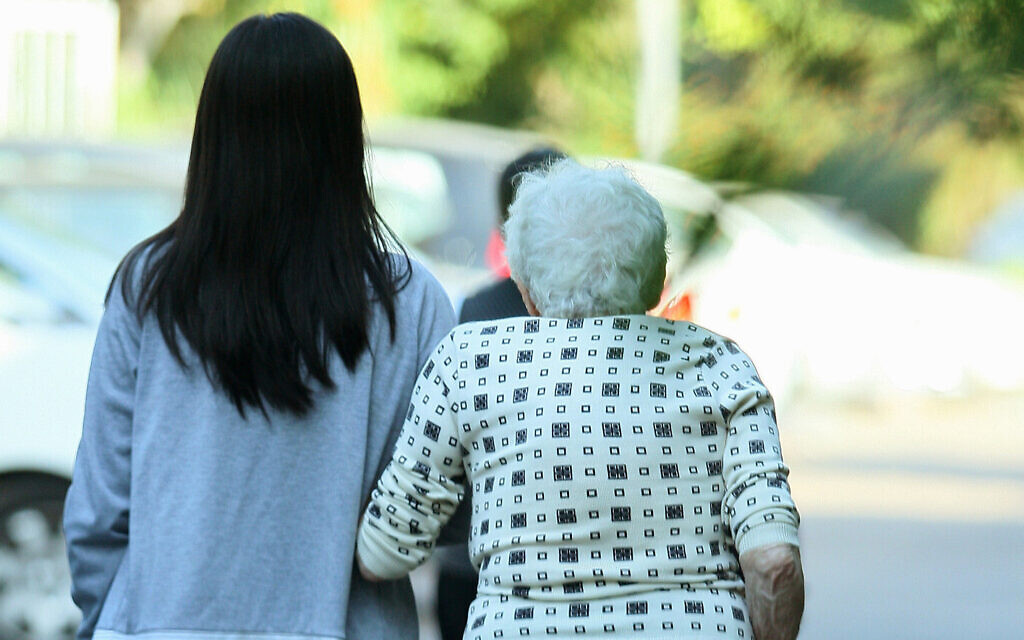
The Iron Lady is forged
In 2017, while working as a caregiver in Tel Aviv, Jean Trapal from the Philippines decided enough was enough. A pastor at the Evangelical Church in Tel Aviv and a carer for a Holocaust survivor, she had paid $4,700 in “placement fees.”
“I did not even realize it was illegal at the time,” Trapal tells The Times of Israel. In her community, she kept hearing about other people crippled with debt and pressure, and so began her campaign to put an end to placement fees. Social media became her soapbox.
“I would do Facebook Lives,” she says, explaining that through the social media platform, she could deliver international public addresses to her friends and acquaintances — other foreign caregivers in Israel and those considering coming over.
‘I DID NOT EVEN REALIZE IT WAS ILLEGAL’
“I talked about it every day. I wrote to the ambassador of the Philippines, who did not respond initially. I talked to the embassy’s labor attaché, who told me, ‘There’s no hope, it’s been going on for 30 years,'” she says.
“I wrote to the authorities in the Philippines; they responded saying there is no solution. Finally, I wrote to the office of the [Filippino] president — and I got a reply!” recalls Trapal.
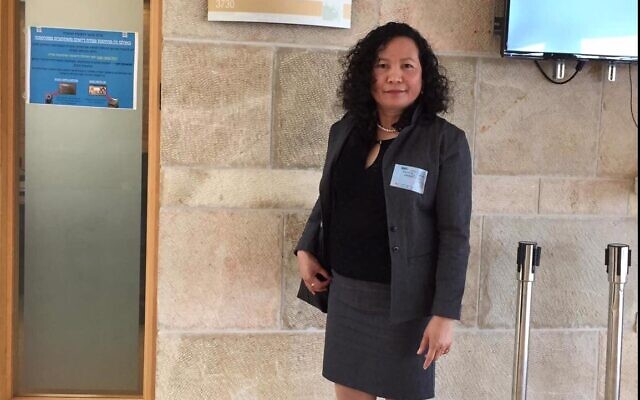
The response from the presidency requesting further information vindicated Trapal, and she began collecting testimonies from caregivers who had paid illegal fees to come to Israel. Her aim was to pressure the governments of the Philippines and Israel to reach a bilateral agreement that would, once and for all, put an end to these fees.
How much is extorted from care workers depends mainly on geography. It turns out that Trapal’s $4,700 was on the lower end of the spectrum.

“The average placement fee payment is different depending on which country the worker is from,” explains Michal Tadjer, an instructor at the clinic for workers’ rights at Tel Aviv University.
“People from the Philippines used to pay around $11,000, but this is now higher since COVID. Those from Eastern Europe pay $9,000-10,000, and those from India pay around $20,000,” says Tadjer, who has spent years working as a lawyer with Kav LaOved (Worker’s Hotline), an Israeli organization defending worker rights and enforcing labor law, to try and put an end to the practice. “All of this is outrageous.”
Meanwhile, Trapal’s struggle earned her the nickname the “Iron Lady” and inspired more Israel-based care workers from other countries to fight the fees.
From the Philippines to India
Jaiden has spent the past 11 years living in Israel working as a carer. Following Trapal’s example, he began a Facebook page that now has almost 40,000 followers. His page mainly deals with issues faced by Indian care workers — in particular, placement fees.
“I am dealing with a case right now,” he says over the phone. “A worker in India has applied for a caregiver visa, but the agents in Israel are asking for a huge amount of money — almost $25,000.”
He explains that the same people charging the money often offer loans to the workers — with a hefty interest rate of approximately eight or nine percent.
“At the moment, we get a lot of complaints, both from fresh applicants in India and from those already in Israel, about how much the agents are charging,” he says.
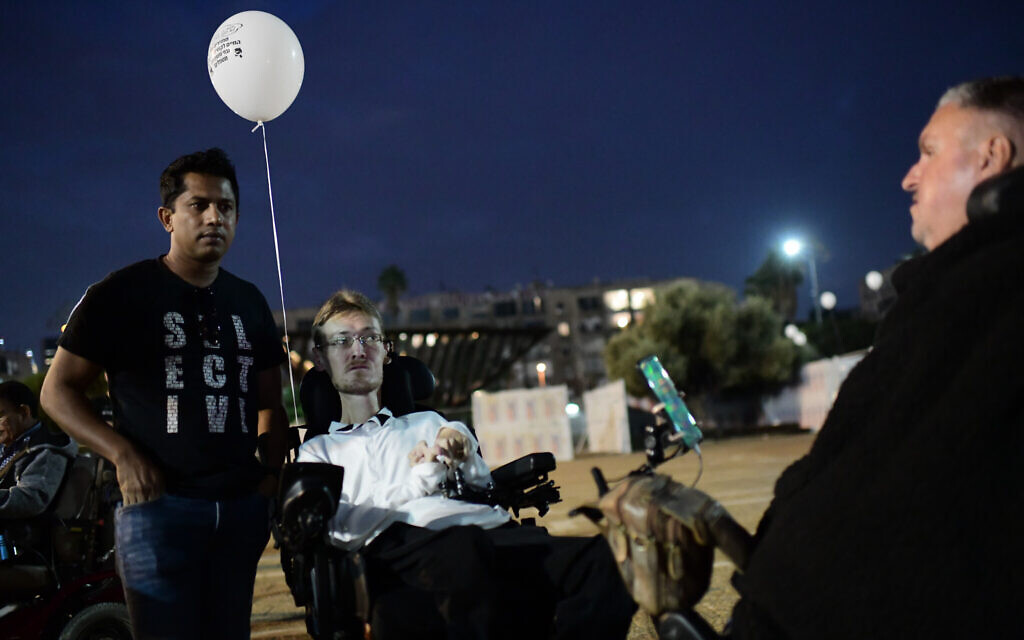
Jaiden explains how the illicit process operates for Indian caregivers in Israel: When potential care workers decide to come to the Holy Land, they apply to India-based manpower agencies that work together with manpower agencies in Israel. An agency never asks for the placement payment directly, Jaiden explains. Instead, it works with an “unaffiliated” broker who does not have an official contract with the agency but works on its behalf. That India-based broker has a counterpart in Israel.
The brokers in Israel are almost always fellow Indian carers who are working on the side as the agencies’ shadow arm, collecting other workers’ “fees” and issuing them high-interest loans in a never-ending spiral of the indebted seeking to pay off their loans by indebting others.
“The Israeli manpower agencies always put migrant workers in the forefront and at risk because if they get caught, there is no link or contract linking them back to the agency,” Jaiden explains.
Kav LaOved confirms that what Jaiden describes is one of the methods used to extract the illegal fees. The common denominator, says the organization, is that the money is delivered to the manpower agency through a broker who is very often a caregiver from the same country as the workers paying the fees and who speaks their language.
THE MONEY IS DELIVERED TO THE MANPOWER AGENCY THROUGH A BROKER WHO IS VERY OFTEN A CAREGIVER FROM THE SAME COUNTRY AS THE WORKERS
“This is one of the ways this operates that we know about,” says Meytal Russo, an attorney in Kav LaOved’s legal department. “We can’t say that it’s always 100 percent the caregiver that does this. There are situations when the broker is rather someone who is staying in Israel undocumented or someone who married an Israeli, and cases like that.”
Because the industry operates through numerous layers of secrecy, it is difficult to track who profits from these fees. But estimates by various sources in public forums, which include senior government officials and the police, suggest that 60%-80% of the placement fees paid by foreign workers end up in the hands of licensed Israeli manpower agencies .
These fees, totaling hundreds of millions of shekels each year, are not reported, so no income tax is paid. Israeli manpower companies are legally permitted to charge an employer of a foreign worker a total of NIS 2,000 (roughly $565) in placement fees upon hiring, and an additional NIS 70 ($20) per month. Charging any other fees is against the law, confirms Kav LaOved.
“The law is not enforced and Israel has refrained from battling this unfair practice,” notes a Kav LaOved report on the issue. It adds that manpower agencies in Israel and abroad “operate a powerful, influential lobby” which prevents Israel and other countries “from establishing an alternative arrangement for bringing migrant workers and the enforcement of the law that forbids collecting brokerage fees.” The report was published in 2013, but little has changed, say the activists.
Corruption runs deep
In 2021, the former head of the department of manpower companies at the Population and Immigration Authority, Nissim Shimoni, was charged with taking bribes and other infractions . In the protocols of court proceedings following his arrest in 2018, according to Hebrew media , police said that Shimoni had quid pro quo relations with the company owners and that the bribes also included sex.

In 2008, Shlomo Benizri, former labor minister for the Shas party from 2001 to 2003, was charged with accepting bribes to allow agencies to bring more migrant workers into Israel , breach of public trust, and obstruction of justice for actions during his stint as minister. He served 2.5 years of his four-year prison sentence.
In 2006, Kav LaOved submitted a petition to the Supreme Court urging the government to sign labor agreements with countries sending migrant workers to Israel. Shortly after, the Ministry of Foreign Affairs changed its position and backed the petitioners’ views that Israel should sign bilateral agreements, which prompted the Israeli government to examine and begin to deal with employment concerns in the principal fields — agriculture, construction, and caregiving — where foreign workers are utilized. However, progress in the caregiving sector has been the slowest.
Shirly Raisin Sasson is the director of the Bilateral Agreements Division, Foreign Workers Administration at the Population and Immigration Authority (PIBA), the main Israeli body responsible for migrant workers in Israel. Sasson says that she and her colleagues had heard of many cases of workers complaining they had paid placement fees and that the cases were referred to government investigators, who didn’t rigorously investigate the claims.
‘THEY ARE WARNED BY THE BROKERS THAT THERE WILL BE CONSEQUENCES FOR THEM AND THEIR FAMILIES IF THEY SPEAK OUT’
“The investigators asked to see proof. And if they [care workers] had proof, it would be of some third party who is not officially part of the manpower agency. So the investigators were not able to file criminal charges,” says Sasson.
Sasson says she is not aware of a single case, in the almost three decades that foreign care workers have been paying placement fees, in which Israeli authorities have prosecuted anyone involved in charging such fees.
With no sign of prosecution for perpetrators, there is little will from the victims, the foreign care workers, to come forward, says Jaiden.
“They are warned by the brokers that there will be consequences for them and their families if they speak out. Many are told that they will be deported,” Jaiden says.
As an example, he cites a case where one migrant worker who intended to speak out against brokerage fees was told by the broker that if he did, the agency would accuse him of being abusive to the person he is caring for and he would be kicked out of the country.
When asked about the threat of deportation, PIBA officials could not promise that such a worker would not be deported, even if he or she gave evidence concerning brokerage fees.
“We guarantee that we will protect the rights of the worker,” says Shoshana Strauss of PIBA’s legal department. She adds that in cases where the payment of placement fees was found to be connected to human or sex trafficking, “we protect the witnesses, even though they paid the money and agreed to come here.”
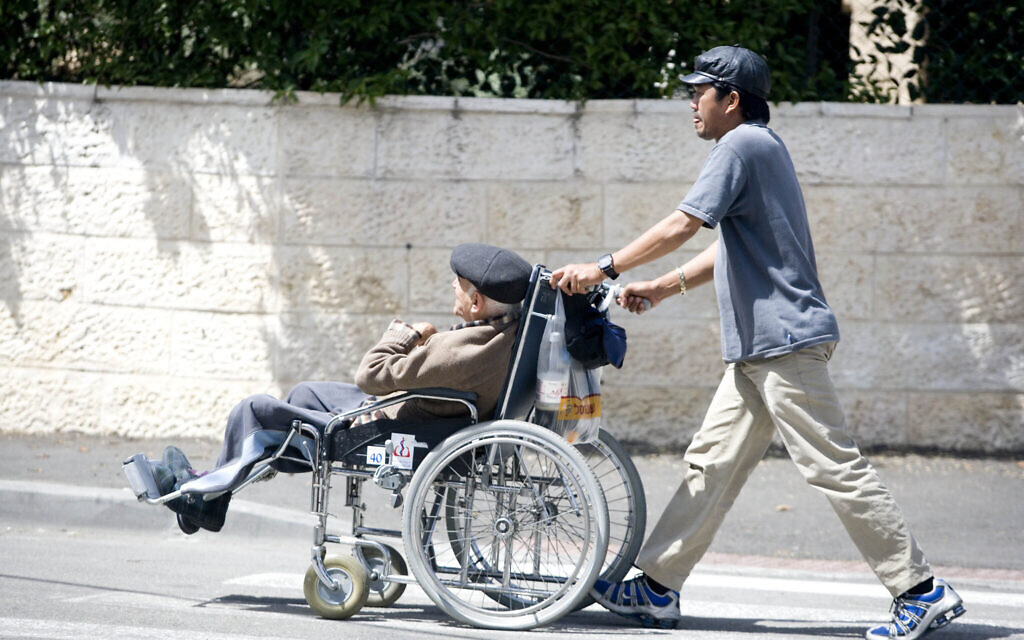
All eight of the care workers interviewed by The Times of Israel who have paid placement fees say that they would not even consider approaching the authorities.
“If the authorities find out, they will send us back to the Philippines,” says Maria, a care worker who arrived late last year.
“They will deport me,” says Natalia from Uzbekistan. “I paid $9,500 to come here. It took me two years to pay it back. Since then, I haven’t been able to go home and see my family for six years,” she says.
‘SOME OF THE FILIPINOS WHO HELPED US FROM THE START, THEY ARE ALSO THE ONES WHO ARE ALSO CONNECTED TO THESE AGENCIES’
Another reason people are reluctant to speak out is that the placement fees system is deeply rooted within parts of the caregiver community. While reporting for this article, The Times of Israel learned that caregivers received explicit warnings through social media not to give out the names of agents and agencies involved to journalists.
“I have now realized that some of the Filipinos who helped us from the start, they are also the ones who are connected to these agencies,” says Maria. “If one is affected, all of them will be affected — and this will come back to us as they have much more power and connections than we do in this country.”
People
power
When “Iron Lady” Trapal began speaking out against the practice, she says, she immediately faced a serious backlash, with the most vocal critics coming from within her community.
“People started sending me messages on Facebook, warning me to stop my activities,” she says. Soon she began to get threatening texts.
“I received messages saying that they will kill me if I don’t stop, that the immigration authorities will deport me. I said, ‘OK, let’s see,’” says Trapal. She emphasizes that what helped her remain strong was her faith and the staunch support of her employer and her family.
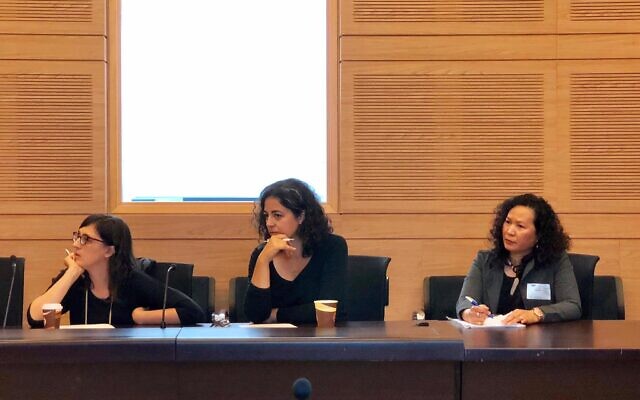
“My [client’s] family supported me in what I was doing and installed security cameras both inside and outside the apartment where I worked so that I felt safe,” says Trapal, who is now back in the Philippines.
Others currently engaged in the same struggle fear deeply for their lives.
“If someone like me raises the issue, it becomes life-threatening work,” Jaiden says, describing death threats he receives through Facebook and by text when others inadvertently reveal his real name. He also says he does not want his identity mentioned because of the contacts he has with brokers and agents directly.
‘IF SOMEONE LIKE ME RAISES THE ISSUE, IT BECOMES LIFE-THREATENING WORK’
Jaiden says he and other activists “can’t abolish the placement fees on our own — we need the governments for that. “
“But what we try and do is help people who are paying money and still not receiving a job offer or a visa,” he says, explaining that they work to pressure the brokers to uphold their promises. “What I’m doing is full of risk. What if someone sues me in India? Sometimes they give a direct threat — that they will do something to my family.”

“We made complaints to the Indian embassy, to the Israeli Interior Ministry,” Jaiden says. “On this issue, everybody knows what is going on, but who will take action?”
The Embassy of India in Tel Aviv confirmed that it was aware of reports of unregulated recruitment and charging of unauthorized placement fees, and said it was working on a bilateral agreement with Israel.
‘ON THIS ISSUE, EVERYBODY KNOWS WHAT IS GOING ON, BUT WHO WILL TAKE ACTION?’
“The proposed bilateral agreement, which both India and Israel are discussing, seeks to create an institutional mechanism to protect the rights of caregivers and aims to eliminate unauthorized placement fees by bringing in transparency,” said Rajiv Bodwade, deputy chief of India’s mission. “There is a sense of urgency on both sides to do this, and we hope that the agreement will be concluded soon. We are confident that the agreement will benefit the caregivers by protecting their rights.”
New hope?
Following Kav LaOved’s petition to the Supreme Court to force the Israeli government to act in 2006, the government slowly began introducing a series of bilateral agreements in all foreign worker sectors.
These bilateral agreements enable the direct recruitment of workers to ensure a supervised procedure that is fully transparent. Such agreements have been accepted practice for decades and are promoted by international organizations such as the International Labour Organization and the International Organization for Migration. In the caregiving sector, there are now bilateral agreements signed with Sri Lanka, Uzbekistan and the Philippines.
‘THE BILATERAL AGREEMENT IS THE BEST MECHANISM THAT I KNOW IN THE WORLD TO STOP ILLEGAL FEES FOR FOREIGN WORKERS’
“I can tell you definitely that the bilateral agreement is the best mechanism that I know in the world to stop illegal fees for foreign workers,” says Sasson from PIBA.
Part of the agreement, bypassing the illegal brokers’ fees, is an idea that comes from a dating application. The innovative mechanism works in such a way that the identity of the applicant is unknown until they are chosen by the family who would be employing them.
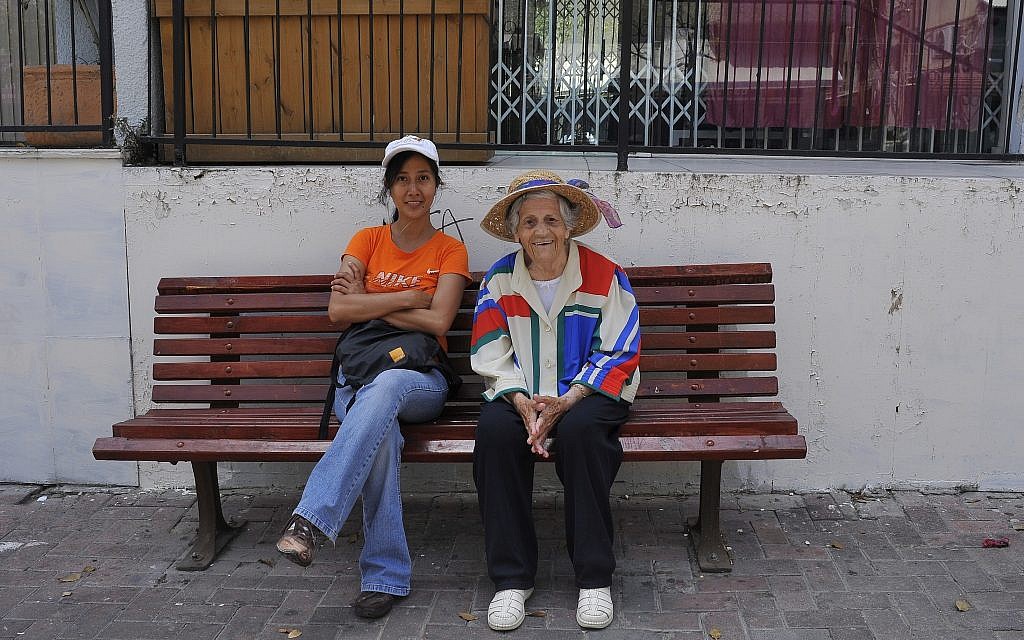
Each applicant has to undergo an interview in their country of origin and answer a computerized questionnaire. The applicant’s real name is masked by an anonymous number to which the licensed manpower agencies and government officials have access.
“They can search their database of applicants. When they find several candidates that seem appropriate, they will send a link to the family and they can see the interviews and the responses in the questionnaires,” says Sasson. Only then is the real identity of the would-be caregiver revealed.
A flawed solution
The agreement with the Philippines was signed in 2018 and implemented in 2021. Yet Trapal is no longer celebrating.
“After the bilateral agreement, I said, ‘I am done.’ But the problem is that when I hear again that there are problems, my blood starts boiling,” she exclaims over the telephone.
Thanks to her reputation in the community, frustrated caregivers are again contacting Trapal with placement fee issues.
One of the women, Lilia, reached out to Trapal in the Philippines. She agreed to share her story with The Times of Israel.

“I applied [for work in Israel as a caregiver] in July 2021,” Lilia says. “The Philippine Overseas Employment Administration staff told me: ‘Just wait, we are sure you will get an employer and a visa.'”
But after months passed with no news, a friend told her that he was contacted by a broker with the offer of “help.”
“I thought it was a joke. But then a broker called me directly and offered to make sure my application gets selected,” Lilia says — for a fee, of course.
The broker asked Lilia to pay thousands of dollars, leaving her incensed. Lilia, refusing to pay the illicit fee, is still in the Philippines and has no job awaiting her in Israel.
“I am adamant that I will not pay. If I pay, I will owe a large sum of money to someone else. I would rather wait to get a job through the correct process. Even though I’ve waited a long time, the time will come when the Lord will give me the ability to work in Israel without paying large sums of money,” she says.
Lilia has shared her experiences with other caregivers in the same situation. One of the women recorded her subsequent conversations with the broker and sent them to The Times of Israel.
The following are some translated excerpts from one of these conversations, on August 5, 2022:
Broker : Because there are so many applicants it’s not easy for them [the Israeli agency] to find your name. But because I will tell them that you are my applicant, they will make more of an effort to find your papers.
Caregiver : Ma’am, those [applicants] who applied almost one year ago, do you have experience of pulling out their applications to help them get to Israel?
Broker : Yes. They asked us to pull out their files and now they are already here. Every applicant has to have their own connections. If you have no connection, nobody can help you to make sure your papers are prioritized. My work is not free but I am not the one setting the price for this. For example, two of my applicants waited almost a year, and then they applied to me and after one week, their papers were selected. After your name is selected and the employer signs, that is when you pay me.
Caregiver : Ma’am, it means that most of the applicants pay these huge amounts?
Broker : Yes, because if you want to come to Israel… nothing is free here. That’s the secret. The agencies are united on this.
Lilia also shared an anonymous letter she authored with a dozen other caregivers who want to come work in Israel but who say they are being asked to pay high placement fees to do so. None of them has paid the fees and all remain in the Philippines.
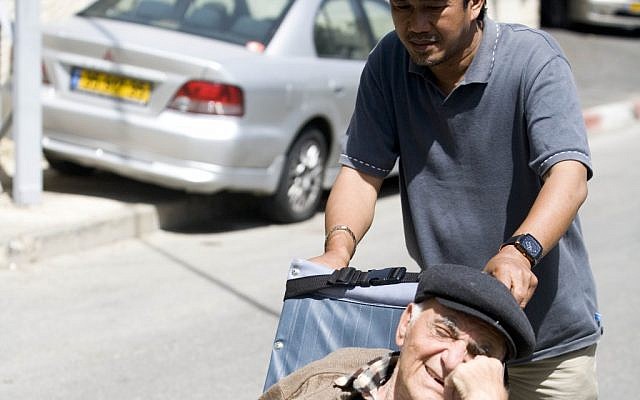
To verify the claims, The Times of Israel also approached Filipino care workers who recently arrived in Israel.
Teresita, a caregiver in southern Israel who arrived in August 2022, says she paid $7,000 in “placement fees” — “half in the Philippines and a half I am still paying in Israel,” she reports on the condition of anonymity, her voice shaking with nervousness on the phone line.
“I waited for eight months in the Philippines but I had no news about a job. I was complaining about this to my friends and then an agent sent me a message through Facebook,” she says. “ One month later, I already had a contract.”
She explains that she left her parents and her teenage daughter behind in the Philippines to take up employment in Israel. “I had no choice, I needed this job to help my relatives,” she says.
‘I HAD NO CHOICE, I NEEDED THIS JOB TO HELP MY RELATIVES’
She is angry about the fees, which she knows she is not supposed to pay. “I want them to know that demanding these placement fees is illegal here,” she says of the brokers working with manpower agencies.
Another care worker, Maria, says she also arrived here in August 2022.
“I submitted my application in January 2022. I waited for six months. Then someone told me, ‘If you want to come quickly — contact this agent.’ I contacted them and paid $7,000 and I arrived here quickly. I am still paying back this money — it will take me a year,” Maria says.
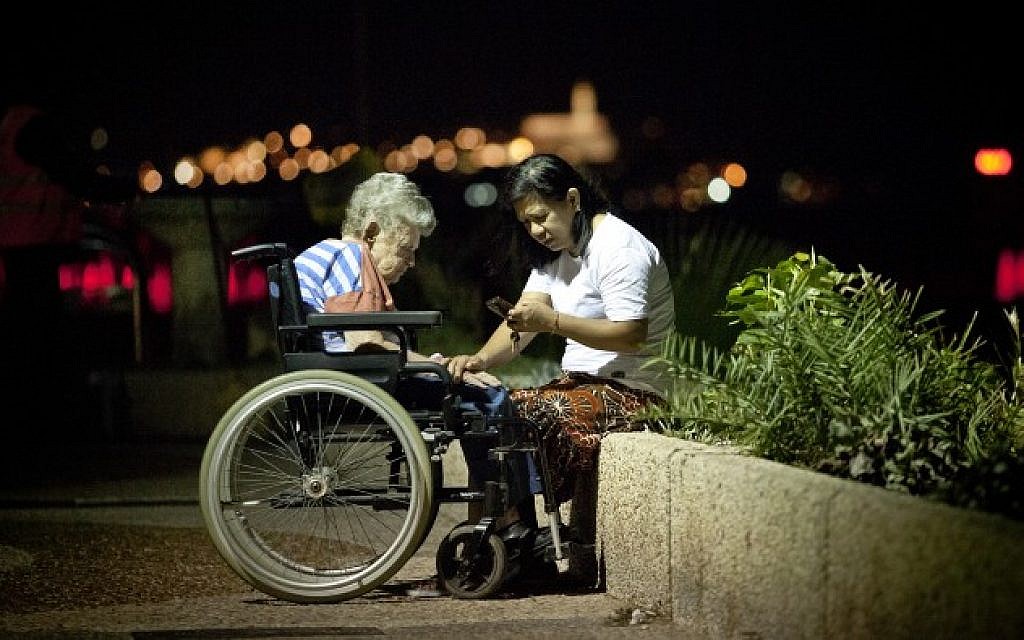
“This is a disease,” says Beni Domingo, a Filipino community leader in Israel who has been aware of the problem for years. “For Filipinos, this is worse than COVID.”
“I don’t care if they threaten me. I am not afraid. The agencies or the brokers tell the caregivers not to speak out. They say: ‘If you will tell, we will cancel your visa and they will deport you,’” he says, naming two of the agencies he understands are involved. (Neither of the agencies responded to requests for comment.)
“And of course the caregivers are afraid — they are new here,” he adds.
In response, PIBA admitted it also has heard of such violations of the bilateral agreement with the Philippines, though only as rumors from both countries.
“Both sides are working together on this closely,” says Sasson. “We would be happy to receive some exact information to investigate. This is the benefit of the bilateral agreement: if there’s an issue we have partners.”
PIBA concedes that there may be a glitch in the system and Sasson admits that “there is a place where perhaps there’s some collusion.”
“But if we know the problem, our investigative branch will look into it. This is often a matter for police and money laundering authorities. Until now, under the private system, they were not able for years and years to file any charges for these crimes. Perhaps under the agreement — because we know who all the players are — if we do receive a complaint and evidence, they will be able to follow through,” she says.
A PIBA representative said there was considerable opposition to the bilateral agreement as many manpower agencies stood to lose a lot of money.
In 2018, the Achioz Organization of Israeli Recruitment Agencies filed a petition with the High Court of Justice against the bilateral agreement procedure for the recruitment of foreign caregivers. The appeal was eventually withdrawn by the petitioners after being heard before the court.
‘IT WAS OBVIOUS THAT PEOPLE FROM BOTH SIDES WERE TRYING TO FOIL THE AGREEMENT’
“It was obvious that people from both sides were trying to foil the agreement,” says Sasson, referring to manpower agencies in Israel and the Philippines.
“I will not be surprised if one of the outcomes of their resistance is these rumors [of renewed fees],” speculates Sasson. “But it doesn’t mean that we don’t have the duty to find a way to improve our agreement and make sure it does not happen.”
“Research shows that bilateral agreements do help to make this phenomenon go away,” says attorney Shiri Lev-Ran Lavi, the commissioner for Foreign Workers’ Labor Rights at the Economy Ministry.
“But to make it hermetically closed, we need to make sure that when we have these kinds of complaints, we deal with them,” Lev-Ran Lavi says, repeating that the implementation of the bilateral agreements is the best solution.
The Embassy of the Philippines and Israel’s Foreign Ministry declined requests for comment.
For Natalia, the care worker from Uzbekistan, there is little hope of a solution or compensation.
“I haven’t been home in six years,” she says, adding that she is trying to save as much money as she can to send home.
“The authorities will deport me if they find out,” she says, referring to her second job as a cleaner. “But I don’t care anymore. I am so tired.”


